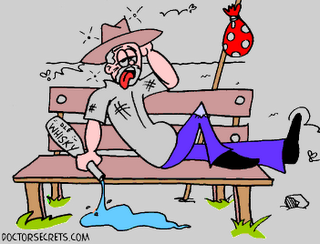More Booze Bedlam in Putin's Russia
 If Russia can't even manage to get booze right, what possible hope is there for anything else? The Times of London reports that "Russian women are facing a bleak winter without perfume because of a government crackdown on bootleg alcohol." How are the two related? The Times explains:
If Russia can't even manage to get booze right, what possible hope is there for anything else? The Times of London reports that "Russian women are facing a bleak winter without perfume because of a government crackdown on bootleg alcohol." How are the two related? The Times explains:
The beauty business has been thrown into turmoil by the introduction of a licensing regime for goods containing more than 1.5 per cent alcohol.
The rule was intended to regulate the drinks industry as part of efforts to curb alcohol abuse. However, it has also left cosmetics companies unable to produce, import or distribute perfume and other products containing alcohol.
Russia’s women must now endure the sobering prospect of empty shelves and soaring prices as supplies of scent, hair spray and deodorant dry up.
German Gref, the Economic Development Minister, who was described by one Russian paper as the Government’s chief “mod” because of his penchant for sharp suits, promised to amend the law to exempt cosmetics.
However, industry representatives told The Times yesterday that the Russian Parliament, the Duma, was unlikely to make the reform in time to prevent Christmas and New Year shortages. They fear that criminal gangs will cash in by flooding the market with fake goods.
Just 187 of Russia’s 3,500 legal distributors have obtained a 230,000 rouble (£4,600) licence since the regulation was introduced in July.
Viktor Kramarenko, a spokesman for Procter & Gamble, Russia’s largest cosmetics company, said that people in smaller cities were already finding it hard to buy products. “If the amendment is not moved quickly, shortages of perfumes and cosmetics are inevitable at the most unfortunate time of the year. Given the speed of the legislative process, it will probably take effect in January at best,” he said.
Tatiana Puchkova, chairman of the Perfumery and Cosmetics Association of Russia, said that supplies fell by 75 per cent in August and had recovered little since then.
“If nothing changes before January then the situation will be terrible. It will be difficult to find perfume and there will be a very big problem of black market production,” she said. “We hope that things will be changed in time for Christmas, but everything depends on the Duma. They must decide within one month.”
The licensing system, which is supervised by the Federal Security Service, the KGB’s successor, was intended to halt a trade in cheap perfume containing bootleg alcohol that alcoholics were buying to drink.
Sergei Bolshakov, the managing director of the Association of Perfumery, Cosmetics and Household Chemicals Manufacturers, said: “People are not buying $100 perfumes so that they can drink them. We are happy that the Government has recognised the crisis that it created, but there is no way that supplies can be restored before Christmas. There are already shortages and prices are doubling for some products.”
Russia’s cosmetics market is worth $7.3 billion (£3.9 billion) a year and almost half of products exceed the threshold for the Government’s alcohol-monitoring regime. As well as the licence, companies were expected to pay a monthly fee of 20,000 roubles.
And remember now, these are good times for the Kremlin, which is awash in oil revenues and hasn't yet begun to really feel the sting of the new cold war it has provoked. Can you imagine what sort of catastrophes will befall Russia at the hands of this government when things get bad?


















No comments:
Post a Comment